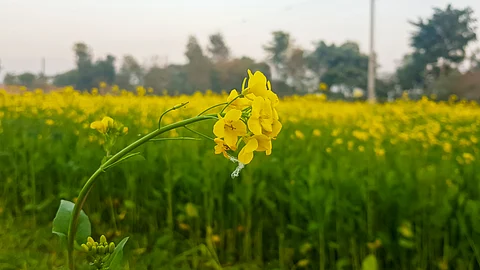

More than 520 representatives of farmer and consumer organisations, environmental groups, industry and exporter associations, and scientific experts from across the country have asked the Union Ministry of Environment, Forest and Climate Change (MoEFCC) to hold consultations on devising a policy on genetically modified (GM) crops.
The stakeholders’ collective appeal to the environment ministry comes three weeks after the Supreme Court directed the Union government to come up with a national policy on GM crops.
In a letter to Leena Nandan, secretary, MoEFCC, the group has asked the government to ensure that the apex court order is implemented in letter and spirit through a thoroughly participatory and consultative process.
It was a case concerning the legality of the commercial sale of GM mustard that triggered the apex court’s move.
On July 23, the top court, in a split verdict, ruled against approval of the commercial sale and environmental release of GM mustard- Dhara Mustard Hybrid (DMH-11) in India till further orders.
A division bench comprising of justices BV Nagarathna and Sanjay Karol announced two separate judgments for the matter that was ongoing for the past 20 years in the Gene Campaign vs Union of India and Others case.
The court also asked the government to formulate a national policy with regard to GM crops for research, cultivation, trade and commerce in the industry.
In a letter dated August 16, the group stated that such consultations should be held in all states of the country, to allow the in-person participation of all stakeholders including the state government representatives.
“Some large states like UP (Uttar Pradesh) might require more regional consultations within the state. Let the locations represent various kinds of political parties in power in the state government so that no allegation of partisanship emerges later on,” it read.
The letter also argued that such consultations be well publicised in local languages in all prominent local newspapers, visual media and websites and should be done well in advance of giving at least three weeks’ notice to the public, while also demanding that these should be video-recorded and archived in the public domain.
Giving adequate publicity was also one of the directions given by the court.
In 2022, the Genetic Engineering Appraisal Committee (GEAC) had allowed for the environmental release of GM mustard named Dhara Mustard Hybrid (DMH-11), created by scientists at Delhi University.
This decision had sparked a debate on the potential impact of GM crops on biodiversity, human health, and agricultural practices.
Till now, the only genetically modified crop which is allowed in India is BT cotton.
“Consultations should ensure that all stakeholders are involved proactively and systematically, including farmers’ organisations, consumer organisations, environmentalists, ecologists, beekeepers, agricultural worker unions, practitioners and experts of Indian Systems of Medicine, organic/natural farming associations and practitioners, organic farming enterprises, exporters and traders etc,” the group noted.
It suggested that in order to actively reach out to multiple stakeholders and facilitate their participation, the government might consider engaging an organisation like Centre for Environment Education (CEE) as was done during the Bt brinjal consultations.
“Consultations should be open for all citizens to provide their inputs as was the case during the public consultations on Bt brinjal in 2009-2010, and should not be restricted to a select few who are invited,” the letter said.
In the SC order, Justice Nagarathna had pointed out that the approval of the GM Mustard sale was permitted by the GEAC on the basis of foreign research and not indigenous studies about the impacts of GM Mustard in India without considering its environmental ramifications.